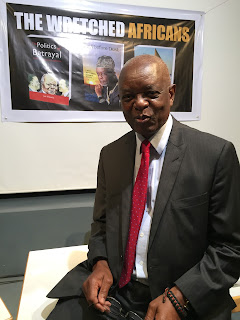"The Chicago Seven," a group of radical Black Panther activists, among them Bobby Seale, Eldridge Cleaver, and Huey Newton, was in court facing prosecution for a variety of offences including plots to bomb public buildings; and everywhere in the country students were demonstrating and engaging in sit-ins on the streets and in university campuses.
The black revolutionary and civil rights activist, Angela Davis, was electrifying crowds with her black power message before she went underground to escape arrest. She was captured in 1971 and taken to court on conspiracy, attempted kidnapping and murder charges. A year later she was acquitted.
In some parts of the country whites were attacking buses carrying black children to stop integration of schools, while white supremacist groups like Ku Klux Klan were rekindling support for segregation among racist whites.
In those decades of the 60s and 70s, race relations were at their lowest ebb in the United States. Many cities were under siege and the National Bureau of Economic Research says the disturbances of the time were "unprecedented in their frequency and scope."
Now in the 2000s, we see a resurgence of similar extreme forms of racial animosity. Black/White tension has risen in most parts of the country and street demonstrations are more frequent now than they were a few years ago, with deadly consequences. The proliferation of guns is not helping to calm the situation either. One estimate puts 88 guns in the hands of every 100 Americans - a staggering reality.
Some of the violence is triggered by killings of young black males by police; some are revenge shootings against policemen by angry black civilians. But looking at events today, the situation is not as bad as it was forty or fifty years ago. It is just eerie and morose. The actions of the Black Lives Matter movement, to my opinion, are a far cry from the violent activities of the Black Panthers. Generally, things have improved though relations between blacks and law enforcement agencies remain acrimoniously sour. The Huffington Post reports 136 black people have been killed by police so far this year.
And as officials say, there is a lot of hurt and grieving on both sides of the color divide and healing is urgently required. But racial harmony cannot be achieved on the streets.
I have decided to dwell on this subject this week not necessarily because of what happened recently but because of a post I saw in the social media this week which tells a story of anguish and despair among African Americans. A group under the tag name We Want to Go Home is collecting signatures to support a petition to African countries asking them to open doors to African Americans wishing "to go back" to the continent from where their ancestors came centuries ago.
"We are simply asking that we have the opportunity to return to the birthplace of our ancestors in order to try rebuild and heal our trauma," says the petition in part. Whether this initiative is based on the African American experiences of recent years is hard to tell. But it has all the hallmarks of the Black to Africa movement of Marcus Garvey in the 1880s.
WWTGH, which is featured under the domain name Change.org, is led by Brenda Pearson, an activist and writer; and as I am writing, the group is about to reach its target of 2,500 signatures which are to be sent with a letter to all the African countries. It will be interesting to see what the Africans think about this initiative.
So far, only Ghana has accommodated returning African Americans. There are 3,000 of them who live, own properties, and run businesses in that West African country.
The question is: Will asylum in Africa solve the problems
Maybe, maybe not. Let's talk.
And that is my say.

Coming back is as much an issue as planning for the environmental change.Africa unfortunately, is mostly in an emerging situation out of the stone age with visionless leaders who are making the emergence rather chaotic.
ReplyDeleteWe in Africa welcome our brothers very much to their home as it should be but the fear is that too much brainwashing has already gone on on both sides making the black race a rather confused race on both sides of the coin.Which culture will reintegration stand on?That is my question.